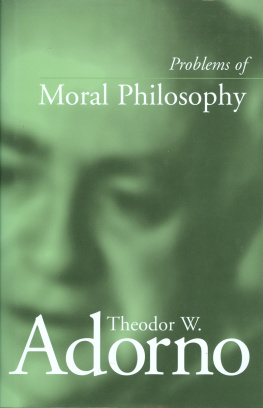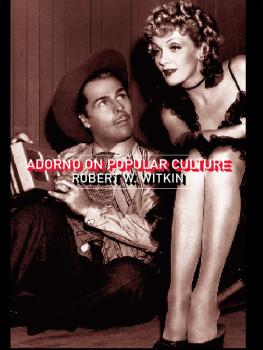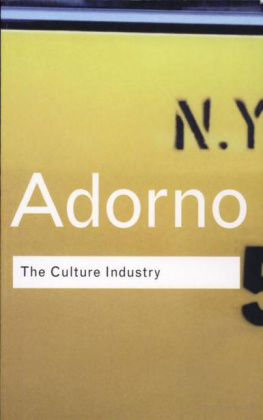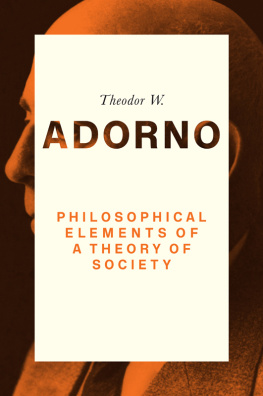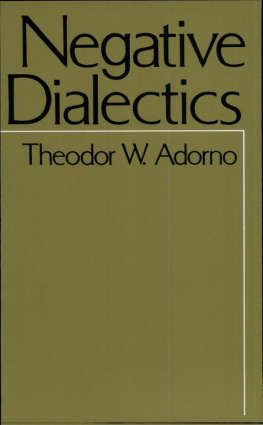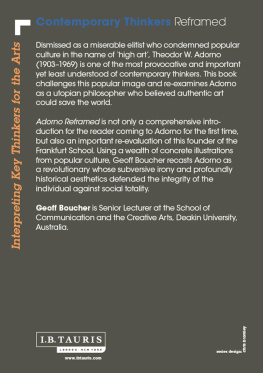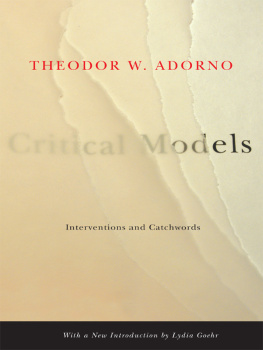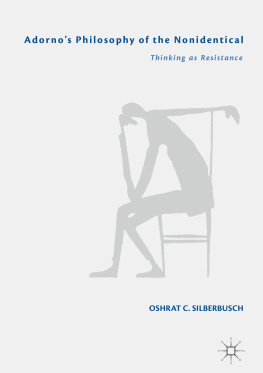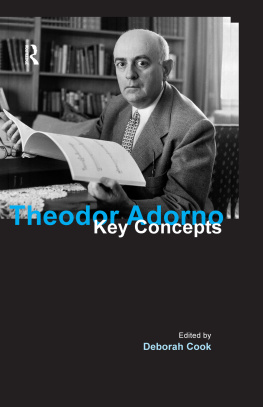Adorno Theodor W. - Problems of Moral Philosophy
Here you can read online Adorno Theodor W. - Problems of Moral Philosophy full text of the book (entire story) in english for free. Download pdf and epub, get meaning, cover and reviews about this ebook. City: Cambridge, UK, year: 2001, publisher: Polity;Wiley, genre: Religion. Description of the work, (preface) as well as reviews are available. Best literature library LitArk.com created for fans of good reading and offers a wide selection of genres:
Romance novel
Science fiction
Adventure
Detective
Science
History
Home and family
Prose
Art
Politics
Computer
Non-fiction
Religion
Business
Children
Humor
Choose a favorite category and find really read worthwhile books. Enjoy immersion in the world of imagination, feel the emotions of the characters or learn something new for yourself, make an fascinating discovery.
- Book:Problems of Moral Philosophy
- Author:
- Publisher:Polity;Wiley
- Genre:
- Year:2001
- City:Cambridge, UK
- Rating:3 / 5
- Favourites:Add to favourites
- Your mark:
- 60
- 1
- 2
- 3
- 4
- 5
Problems of Moral Philosophy: summary, description and annotation
We offer to read an annotation, description, summary or preface (depends on what the author of the book "Problems of Moral Philosophy" wrote himself). If you haven't found the necessary information about the book — write in the comments, we will try to find it.
Problems of Moral Philosophy — read online for free the complete book (whole text) full work
Below is the text of the book, divided by pages. System saving the place of the last page read, allows you to conveniently read the book "Problems of Moral Philosophy" online for free, without having to search again every time where you left off. Put a bookmark, and you can go to the page where you finished reading at any time.
Font size:
Interval:
Bookmark:

Adorno's writings published by Polity Press
The posthumous works
Beethoven: The Philosophy of Music
Introduction to Sociology
Problems of Moral Philosophy
Other works by Adorno
Theodor W. Adorno and Walter Benjamin, The Complete Correspondence 19281940

Copyright this translation Polity Press 2000
First published in Germany as Probleme der Moralphilosophie Suhrkamp Verlag, 1996.
First published in 2000 by Polity Press in association with Blackwell Publishers Ltd.
Published with the assistance of Inter Nationes, Bonn.
Editorial office:
Polity Press
65 Bridge Street
Cambridge CB2 1UR, UK
Marketing and production:
Blackwell Publishers Ltd
108 Cowley Road
Oxford OX4 1JF, UK
All rights reserved. Except for the quotation of short passages for the purposes of criticism and review, no part of this publication may be reproduced, stored in a retrieval system, or transmitted, in any form or by any means, electronic, mechanical, photocopying, recording or otherwise, without the prior permission of the publisher.
Except in the United States of America, this book is sold subject to the condition that it shall not, by way of trade or otherwise, be lent, re-sold, hired out, or otherwise circulated without the publisher's prior consent in any form of binding or cover other than that in which it is published and without a similar condition including this condition being imposed on the subsequent purchaser.
ISBN 0-7456-1941-X
ISBN 978-0-7456-9442-9 (epub)
ISBN 978-0-7456-9349-1 (mobi)
A catalogue record for this book is available from the British Library.
7 May 1963
Ladies and Gentlemen,
You have come in such large numbers to a course of lectures whose subject cannot be expected to exert an immediate attraction for young people that I have the feeling that I owe you something of an explanation and even an apology, and that I should warn you against excessive expectations. When you attend a course of lectures given by someone who has written a book on the good or rather the bad life, The problems I shall be discussing here and which belong in the general horizon of your philosophical education are quite definitely those of moral philosophy as a theoretical discipline. So if I am going to throw stones at your heads, if you will allow the expression, it will be better if I say so at the outset than for me to leave you under the illusion that I am distributing bread. And if the bread that you hope to receive fails to materialize, this may mean that the stones I have thrown will miss, or and this is my real hope they will not turn out to be too terribly hard. For the theorems that I shall lay before you will not be too rigorously scholastic.
When I say that I hope that the stones will miss you or that they will not prove to be too terribly hard, I have something particular in mind that may in a certain sense help to re-establish that link with your own living interest. For even though I am quite clear in my mind that a course of lectures on moral philosophy can be of no direct assistance in your lives, I am no less convinced that you are justified in your desire to learn about the good life. The only problem here is that I do not in any sense feel authorized to hold forth to you about that. And precisely because I am aware that very many of you have great confidence in me, I would be extremely reluctant to abuse that confidence by presuming to slip into even if it were only through my lecturing style the false persona of a guru, a sage. I should wish to spare you that, but I should also wish above all to spare myself the dishonesty of such a pose. Nevertheless, when I say that there will be a link to you and your vital interests, I would like to indicate what it will not consist in. For however justifiable your interest in gaining useful knowledge from a course of lectures on moral philosophy, there is nowadays a great danger of what might be termed an illicit shortcut to practical action. And we must make clear from the outset that moral philosophy has a necessary connection with practical action. In the various divisions of philosophy moral philosophy is customarily defined as practical philosophy, and Kant's chief work, one that is devoted to moral philosophy, bears the title of a Critique of Practical Reason. I must mention here en passant that the concept of the practical should not be confused with the degenerate concept that has become current nowadays and can be seen in the way people refer to a practical person as someone who knows how to tackle problems and cope with the problems of life in a clever way. Practicality here goes back to its philosophical origins in  and and to the Greek meanings of doing, acting. In the same way, the themes of Kant's practical philosophy in the second part of the Critique of Pure Reason, the section dealing with the Transcendental Doctrine of Method are formulated in the celebrated question that is undoubtedly familiar to you all: What shall we do? This reproach about the uselessness of theory, this impatient need to hurl oneself into action without delay spells the end of any kind of theoretical work and contains within itself, teleologically, as if it had been assumed from the outset, a relationship to a false, in other words, an oppressive, blind and violent form of practice.
and and to the Greek meanings of doing, acting. In the same way, the themes of Kant's practical philosophy in the second part of the Critique of Pure Reason, the section dealing with the Transcendental Doctrine of Method are formulated in the celebrated question that is undoubtedly familiar to you all: What shall we do? This reproach about the uselessness of theory, this impatient need to hurl oneself into action without delay spells the end of any kind of theoretical work and contains within itself, teleologically, as if it had been assumed from the outset, a relationship to a false, in other words, an oppressive, blind and violent form of practice.
Ladies and Gentlemen, I urge you therefore to exercise a certain patience with respect to the relations between theory and practice. Such a request may be justified because in a situation like the present one about which I do not entertain the slightest illusion, and nor would I wish to encourage any illusions in you whether it will be possible ever again to achieve a valid form of practice may well depend on not demanding that every idea should immediately produce its own legitimating document explaining its own practical use. The situation may well demand instead that we resist the call of practicality with all our might in order ruthlessly to follow through an idea and its logical implications so as to see where it may lead. I would even say that this ruthlessness, the power of resistance that is inherent in the idea itself and that prevents it from letting itself be directly manipulated for any instrumental purposes whatsoever, this theoretical ruthlessness contains if you will allow me this paradox a practical element within itself. Today, practice and I do not hesitate to express this in an extreme way has made great inroads into theory, in other words, into the realm of new thought in which right behaviour can be reformulated. This idea is not as paradoxical and irritating as it may sound, for in the final analysis thinking is itself a form of behaviour. In its origins thinking is no more than the form in which we have attempted to master our environment and come to terms with it testing reality is the name given by analytical psychology to this function of the ego and of thought and it is perfectly possible that in certain situations practice will be referred back to theory far more frequently than at other times and in other situations. At any rate, it does no harm to air this question. It is no accident that the celebrated unity of theory and practice implied by Marxian theory and then developed above all by Lenin should have finally degenerated in [Stalinist] dialectical materialism to a kind of blind dogma whose sole function is to eliminate theoretical thinking altogether. This provides an object lesson in the transformation of practicism into irrationalism, and hence, too, for the transformation of this practicism into a repressive and oppressive practice. That alone might well be a sufficient reason to give us pause and not to be in such haste to rely on the famous unity of theory and practice in the belief that it is guaranteed and that it holds good for every time and place. For otherwise you will find yourself in the position of what Americans call a joiner, that is to say, a man who always has to join in, who has to have a cause for which he can fight. Such a person is driven by his sheer enthusiasm for the idea that something or other must be done and some movement has to be joined about which he is deluded enough to believe that it will bring about significant changes. And ultimately, this enthusiasm drives him into a kind of hostility towards mind that necessarily negates a genuine unity of theory and practice.
Next pageFont size:
Interval:
Bookmark:
Similar books «Problems of Moral Philosophy»
Look at similar books to Problems of Moral Philosophy. We have selected literature similar in name and meaning in the hope of providing readers with more options to find new, interesting, not yet read works.
Discussion, reviews of the book Problems of Moral Philosophy and just readers' own opinions. Leave your comments, write what you think about the work, its meaning or the main characters. Specify what exactly you liked and what you didn't like, and why you think so.

